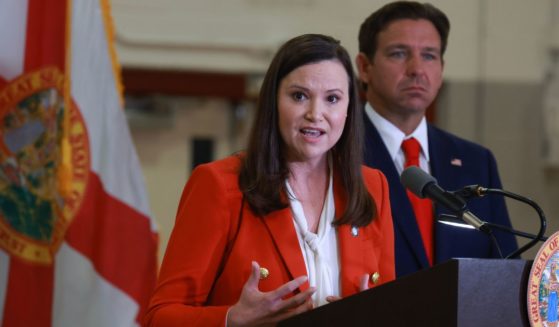Even as Gas Prices Surge, Charging an Electric Vehicle Can Still Be Way More Expensive Than Gassing Up a Car
Those trying to sell us on buying electric vehicles often claim that drivers can save money by not having to buy gas, but is that really the case? In many regards, some analysts have their doubts.
As the average cost per gallon of gas has soared past $4.20, and with no end in sight, many of our leaders — including Joe Biden — are pushing EVs as a cost-effective replacement for gas-powered cars.
As Fox Business recently noted, a one-to-one comparison of the cost of charging an EV versus filling a regular auto with gas showed that EV charging appeared cheaper. But many other factors need to be included in the math to make a true analysis — factors that many EV advocates are desperate to ignore.
“According to the EPA, the national average for a kilowatt-hour of electricity is 13 cents, including at homes where most electric car owners charge their vehicles with 240-volt Level 2 chargers that typically take eight hours or more to fill them up,” Fox reported on Wednesday. “Many of these are also available in public settings like office and shopping center parking lots, where they are known as destination chargers.”
There are also a few facilities that offer what are known as “Level 3” charging stations, which can charge an EV in as fast as 20 minutes. Tesla, for instance, has rolled out Supercharger stations that can significantly cut down the charging time.
Meanwhile, costs per kilowatt-hour vary widely. For those using Level 2 charging stations in their homes — where gaining a full charge takes eight hours or longer — the costs are a relatively cheap 13 cents per kilowatt-hour. But costs jump when using public services. The fast-charge rates come closer to 50 cents per kilowatt-hour, though the electric charge is gained in minutes, not hours.
Fox noted that an electric Ford Mustang Mach-E would cost an owner $2,100 annually for 15,000 miles of driving and charging at a Level 3 station, compared to a mere $650 for the Level 2 home charging system.
In contrast, the Ford Escape S would cost $2,100 for similar driving with current gas rates, a cost that will increase as gas goes up.
This certainly seems like a savings, and it is a major selling point for Biden’s Secretary of Transportation Pete Buttigieg.
In March, Buttigieg told Americans to buy an EV, so they don’t have to worry about gas prices.
“Clean transportation can bring significant cost savings for the American people, as well,” Buttigieg said. “Last month, we announced a $5 billion investment to build out a nationwide electric vehicle charging network, so that people from rural to suburban to urban communities can all benefit from the gas savings of driving an EV.”
But charging your EV comes with its own set of pricey problems. As noted above, costs are rising per kilowatt-hour when using public stations, and using a home charger offers the biggest savings. However, owners also have to shell out between $700 and $2,000 to install a Level 2 home charging unit, Carvana reported. This might tend to make the first year’s savings for not buying gasoline a wash.
Worse, if you want to install a Level 3 charger in your home, you’ll be hit with costs of up to $50,000 or more — including upgrading the electrical system in your house to power the thing.
Few people will be able to afford such a costly installation for super charging their EVs, meaning that the largest number of Americans who buy EVs will be stuck with systems that take half a day to charge their vehicles. This makes their EV of more limited use than a gas-powered car that users can jump in and use at will.
Furthermore, repair costs are higher for EVs than for gas-powered cars, Road Show News found. This is because the whole EV market is still so new that parts are more costly, and so are labor costs. Add in the fact that only a select few mechanics are even trained to repair EVs, and drivers will find the selection of repair shops fewer and farther between, and the labor costs higher due to supply and demand. Presumably, this would even out in the coming years, but right now it is a costly concern.
Also, a major source of expense for EVs is battery pack replacement. Depending on the car, battery packs can last between 5 and 20 years, but the replacement costs might make keeping the car prohibitive. Some experts say that the average battery life is eight years or 100,000 miles, and depending on the model, battery packs cost between $5,000 and $20,000 to replace — not including labor.
This high cost is also a warning to anyone buying a used EV. After all, if you buy a 10-year-old EV that still has its original battery, you might be forced to fork out another $10,000 to replace a dead battery pack shortly after putting as much as $25,000 to purchase the used vehicle. This is a cost that few average Americans can afford.
Another issue is a geopolitical concern.
Many of the rare earth minerals — such as lithium — and the manufactured batteries and parts are made in China, and the costs for these materials are also skyrocketing.
Indeed, in December it was found that the cost of lithium had surged more than 250 percent over the year. Not only are these materials rising in expense, but we are enriching China in the process.
Electric vehicles do have their selling points, it is true. But they simply are not yet practical for every American. If one thing is sure, they are not a panacea, and consumers should really take the time to review their options when considering them.
Truth and Accuracy
We are committed to truth and accuracy in all of our journalism. Read our editorial standards.
Advertise with The Western Journal and reach millions of highly engaged readers, while supporting our work. Advertise Today.












